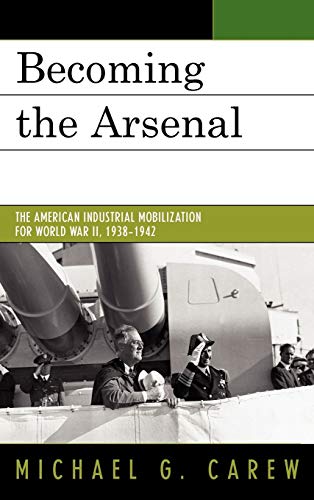
Becoming the Arsenal
by Michael G. Carew
"The American Industrial Mobilization for World War II, 1938-1942"
Popularity
1.07 / 5
* A book's popularity is determined by how it compares to all other books on this website.
Where to buy?
Buy from Amazon* If you buy this book through the link above, we may receive a small commission at no extra cost to you.
Becoming the Arsenal by Michael G. Carew
Details
War:
World War II
Perspective:
Researcher
True Story:
Yes
Biography:
No
Region:
North America
Page Count:
341
Published Date:
2010
ISBN13:
9780761846680
Description
Main Themes and Topics
"Becoming the Arsenal" by Michael G. Carew centers around the significant transformation in the relationship between the government and the private sector during pivotal moments in American history, notably the mobilization of the American economy in response to World War II. The book meticulously examines this as the third critical event—following the Great Depression and the end of the Gold Standard—that reshaped economic governance in the United States. Carew's narrative unfolds in three parts: the May-June 1940 mobilization decision, the influences of World War I, and the development and execution of the "Victory Plan" leading up to early 1943. The text seeks to explore and evaluate these events within their political-economic and military contexts, providing a comprehensive analysis of how the U.S. evolved into a formidable economic force.
Writing Style and Tone
Michael G. Carew writes with a scholarly yet accessible approach, embedding a detailed historical analysis within the broader context of economic and political change. His tone is informative and precise, aiming to elucidate complex historical interactions in a manner that is both engaging and insightful for readers familiar with economic history. Carew's structured presentation in three distinct parts allows for a logical progression of ideas, making the intricate subject matter more digestible.
Brief Summary
"Becoming the Arsenal" chronicles the strategic economic mobilization of the United States as it confronted the Axis powers during World War II. It explores the decision-making processes that led to a full-scale mobilization, examines the influence of prior historical events such as World War I and the 1930s economic diplomacy, and delineates the development of the "Victory Plan." The book delves into how these actions facilitated a transformation in the economic landscape, highlighting the significant role that government and private sector collaboration played in achieving comprehensive mobilization.









